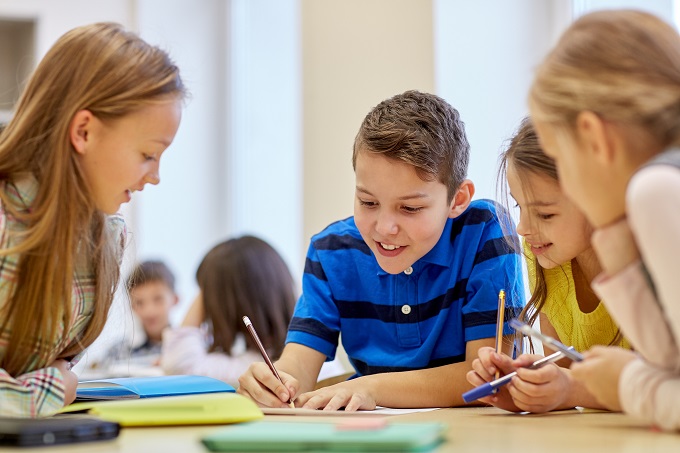
Working in mixed ability groups is a feature of destreamed classrooms. Image: AdobeStock by Syda Productions
<h2><span data-contrast="auto">A new report detailing the first year of destreaming efforts in Aotearoa, named </span><i><span data-contrast="auto">Kōkirihia Annual Report 2024, </span></i><span data-contrast="auto">has been released. </span><span data-ccp-props="{";201341983";:0,";335559739";:160,";335559740";:279}"> </span></h2>
<p><span data-contrast="auto">The new report documents progress from the original destreaming plan titled </span><i><span data-contrast="auto">Kōkirihia &#8211; The plan to end streaming in our schools. </span></i><span data-contrast="auto">This plan has three key parts: awareness, alternatives and actions.</span><span data-ccp-props="{";201341983";:0,";335559739";:160,";335559740";:279}"> </span></p>
<p><a href="https://www.schoolnews.co.nz/latest-print-issue/" target="_blank" rel="noopener"><strong>Read the latest print edition of <em>School News</em> HERE</strong></a></p>
<p><span data-contrast="auto">On awareness, there has been increasing understanding and research on the harms of streaming in our schools. Streaming has been shown to be one of the key drivers of inequity, with Māori, Pacific and low-SES students being over-represented in lower streams. Lower stream classes are found to trap students in a low achievement pathway. Media coverage of the harms of streaming also increased, with community engagement rising and </span><i><span data-contrast="auto">Kōkirihia</span></i><span data-contrast="auto"> being noted in the 2022 OECD Pisa report. </span><span data-ccp-props="{";201341983";:0,";335559739";:160,";335559740";:279}"> </span></p>
<p><span data-contrast="auto">Alternatives to streaming have been implemented in many schools, with viable alternate models proving to lift achievement and improve outcomes. High expectations from teachers and mixed-ability classroom structures and groupings led to improved student achievement. Mixed-ability and flexible grouping, supportive class environment and skill-based goal setting and teacher monitoring were shown to be key characteristics of destreamed classrooms. Several schools and initatives were highlighted, such as <a href="https://www.schoolnews.co.nz/2023/08/principal-speaks-true-equity-in-education/" target="_blank" rel="noopener">Te Kōmanawa Rowley School</a>, Christ’s College, and Fairfield College. </span><span data-ccp-props="{";201341983";:0,";335559739";:160,";335559740";:279}"> </span></p>
<p><span data-contrast="auto">Finally, creating a movement for rangatahi was highlighted as a predominant action. This ensured young people felt they had autonomy over their futures and were part of the decision making around destreaming. </span><span data-ccp-props="{";201341983";:0,";335559739";:160,";335559740";:279}"> </span></p>
<p><b><span data-contrast="auto">Ending streaming practises</span></b><span data-ccp-props="{";201341983";:0,";335559739";:160,";335559740";:279}"> </span></p>
<p><i><span data-contrast="auto">Kōkirihia &#8211; The plan to end streaming in our schools,</span></i><span data-contrast="auto"> was released in early 2023 following years of research that showed streaming was leading to inequitable outcomes in our schools, especially for rangatahi Māori. </span><span data-ccp-props="{";201341983";:0,";335559739";:160,";335559740";:279}"> </span></p>
<p><span data-contrast="auto">The plan was jointly created by the Ministry of Education, Mātauranga Iwi Leaders Group, and Tokona te Raki. Input was sought and received from these groups as well as rangatahi, tumuaki, CORE education, universities, NZQA and ERO. </span><span data-ccp-props="{";201341983";:0,";335559739";:160,";335559740";:279}"> </span></p>
<p><span data-contrast="auto">The first annual report and the </span><i><span data-contrast="auto">Kōkirihia</span></i><span data-contrast="auto"> action plan can be found </span><a href="https://www.maorifutures.co.nz/research-listings/" target="_blank"><span data-contrast="none">here</span></a><span data-contrast="auto"> in full. </span><span data-ccp-props="{";201341983";:0,";335559739";:160,";335559740";:279}"> </span></p>

NZEI Te Riu Roa is considering legal action against the government for the disestablishment of…
NZQA is implementing AI-marking for all Year 10 written assessments from this year onwards, following…
Teaching personal financial responsibility isn't enough. Children should be taught broader economic context, argue New…
When students can't hear the teacher, they can't learn properly. Sound quality matters in education…
The Garden City is rich with learning opportunities, no matter what subject or part of…
Teaching Council of Aotearoa launch school leaders’ stories project with Unteach Racism to challenge institutional…
This website uses cookies.